
Introduction
From September 2016 children from 3 years of age will be entitled to avail of their Free Preschool Year and continue in Pre-school education until they are 5 ½ years or until they start school.
In September 2016, the new "Access and Inclusion Model" (AIM) of supporting access to the Early Childhood Care and Education (ECCE) Programme for children with a disability was Implemented. The model focuses on the developmental level of a child with a disability, their functional ability and their needs. It does not focus on the child’s diagnosis as it is recognised that children may not have a formal diagnosis 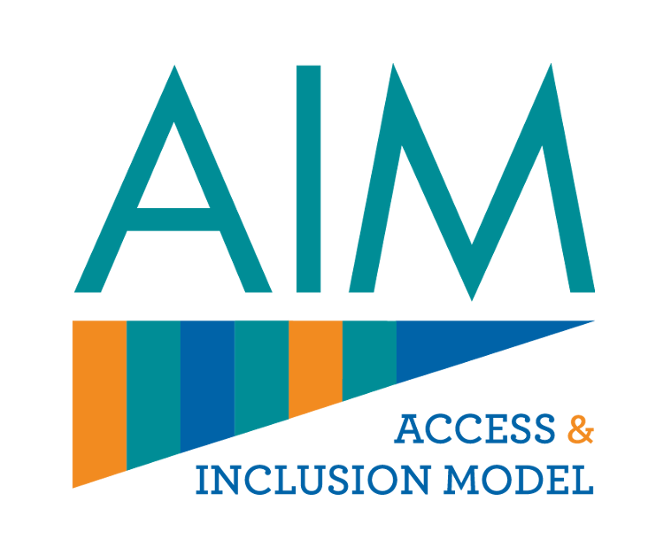 at the time of presenting to Preschool.
at the time of presenting to Preschool.
Below is a summary of supports that will be available for parents and their pre-school child with additional needs, through the new model
- An information pack and a dedicated website with links to relevant children’s services
- A dedicated Inclusion Co-ordinator, who will have special purpose qualification in educating children with a disability.
- A grant may be available to the early education service your child is attending, if there are any adaptions to be made to the environment or specialised equipment needed to help your child fully participate in ECCE.
- Enhancements to HSE Therapy Services to improve access to therapeutic services that enable your child enrol and fully participate in ECCE
- Additional capitation for your child if more support is required in the early education service they are attending. The service may use this funding to hire extra staff to reduce adult: child ratios. This will ensure that your child can be fully involved in and benefit from the ECCE programme.
Choosing a quality early years education setting can be challenging for a parent, especially if you are unclear of the different types of programmes/curriculum available. It can also be challenging if you have a child with a disability to find an early education service that will have the knowledge, skills and facilities to cater for your child.
This section is designed to give you the information about the different types of preschool programmes/curriculum available. It will also take you through the steps to choosing the right early year’s education setting, including questions to ask and things to look for on a visit. There will also be specific questions to consider when choosing a preschool for a child with a disability.
Types of Programmes/Curriculum Available
Telephone Interview
Visiting the Service
Making the Decision
Settling-in
There are a variety of programmes or curriculum approaches that can be offered within early childhood services, each with its own particular view of children, childhood and the early learning process. They all have much in common, for example, the activities and experiences provided for the children. Services however differ in the structure and framework provided for children’s learning and the emphasis placed upon certain aspects of learning. Some programmes are available part-time or full-time. As a parent, it is important that you understand and are comfortable with what best suits your child.
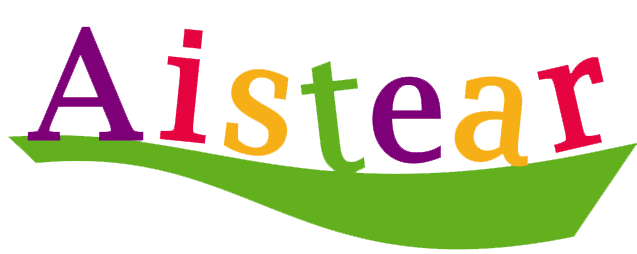

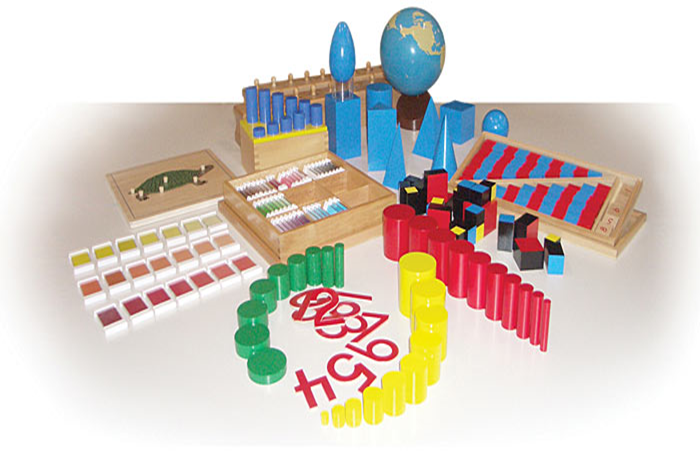
Aistear, the Early Childhood Curriculum Framework Play-Based Montessori
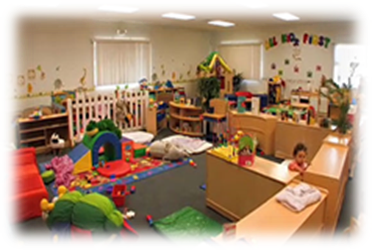

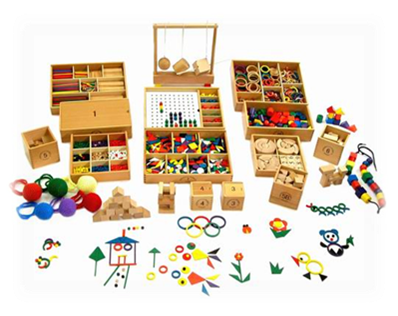
High-Scope Steiner Froebel
Conducting a telephone interview is a useful way to narrow your search. It is a good idea to contact a few early childhood education settings in order to see which best suits your needs and the needs of your child. If you are a parent of a child with additional needs, there are a few more specific questions that you should ask, to determine the level of availability for your child and the experience of the people in the service in caring for a child with a specific additional need
TIP: Avoid making the phone call at busy times such as arrival, departure, or lunch time.
Questions to Ask
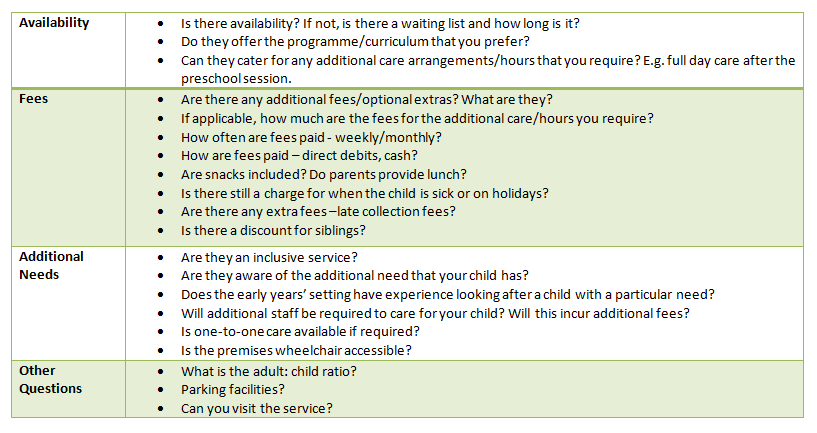
Visiting the services you have short-listed is a crucial step in the decision making process as it gives you an opportunity to meet the people who will be responsible for providing crucial early education to your child.
This section will highlight the things that you should look out for during the visit and some recommended questions to ask
- TIP: Visit the service when other children are there to get a “true sense and feel” for the service
- TIP: Bring your child with you, to see how the staff interacts with your child. This is particularly useful if you have a child with an additional need as you can determine how comfortable the staff is with your child’s additional need, simply by how they react to them.
- TIP: Bring someone else with you. They can act as a second set of eyes for you on the service and look after your child for you as you talk specifics with the Manager.
A quality early years education provides a safe, healthy environment that supports the physical, emotional, social, moral and intellectual development of all children, including children with an additional need. There are certain quality standards that an early years education setting should meet that can provide this type of environment for your pre-schooler.
Premises
The premises should be large enough to offer freedom and space to each child, yet the area should not be so large that it hinders supervision

Facilities Available
The premises should have a sense of order and cleanliness that is balanced with a sense of creativity and fun.

Room Environment and Play Opportunities
The environment in which children spend their time is the pinnacle of a quality early years education setting. Is should be bright, welcoming and interesting to your child, with a variety of resources and play equipment. Outdoor play should be accessible to children every day, regardless of the weather.

Daily Routine
A daily routine needs to be flexible and child-centred, in order to meet the individual and group needs of all the children attending the service. A consistent routine day after day gives children the sense of security they need to make choices and take risks, which opens the door to exciting learning opportunities

Interactions
The setting should encourage positive interactions between all children. The staff should actively engage in interactions with children individually and in groups and support in the development of relationships between both children and staff and children together.

Parental Involvement
As the most important people in children’s life, parental involvement should be at the heart of any quality childcare setting. A parent should be regularly consulted with regarding their child and be presented with a parent’s handbook with details of the services policies and procedures, mission statement, opening hours, curriculum/programme and relevant fees.

Staff
All staff in a childcare setting and childminders are required to have skills, knowledge and attitudes appropriate to their roles and responsibilities within the setting.

Policies and Procedures/Legal requirements
Most childcare services are obliged by law to implements a range of up to date policies and procedures, which should be reviewed on a regular basis.

Deciding what early education centre to send your child is very important so you have a right to be choosy. There are a lot of things to consider in terms of your needs and the needs of your child. Below is a little assistance that will make the process of deciding a little easier.
- Review the information that you have gathered.
- If you still have questions or are unclear on something, call the service back and clarify.
- If you are not comfortable with the service or it does not meet your needs, keep looking. Trust your gut instinct.
- If you are happy with the service, book your child in or put your child’s name on the waiting list, if full.
- Find out when and who will contact you with starting date etc.
Starting off new can be a daunting experience for anybody, especially for children with additional needs. Most children need time to settle into their new early years setting. Most early years services will have a ‘settling in’ policy which is designed to help children adjust to their new environment and situation.
Before the settling-in phase, however, you will be required to review and sign-off on the relevant policies and procedures outlined in the parent handbook and sign a contract that details fees owed and schedule of fees. It is important to ensure that you are aware of and comfortable the relevant policies and procedures that could affect your child. Ask for clarification if you do not understand something.
You may also be given a registration/enrolment form. This will gather details including:
- Child’s name, address, DOB
- Who the child lives with
- Emergency contact person/number
- Names of people who are permitted to collect your child
- Your child’s doctor’s name and number
- Vaccinations your child has received
- Dietary requirements, allergies, likes and dislikes, settling techniques.
- Language spoken at home
- Siblings names or people close to your child
- *Specific details about your child’s additional needs – description of routines, medicine required, settling/calming techniques (you may be needed to demonstrate these procedures for staff also)
Once these details have been submitted you should liaise with the named contact person to work out a settling in period for your child.
- Prepare your child- Talk positively about the service, use the name of the staff when talking about the service.
- Take time on their first few mornings, to accompany them to the service, reassuring them that you will be back soon to pick them up.
- Find out what the daily schedule of activities so you can chat to your child about their day.
- Try to allow time daily to chat to them about their day
It is important to not feel distressed if your child does not settle right away. Separation from parents can be a difficult time for a child and it is important that this process is not rushed. The childcare service will have settling techniques that they will discuss with you, to help your child settle into and enjoy the service.